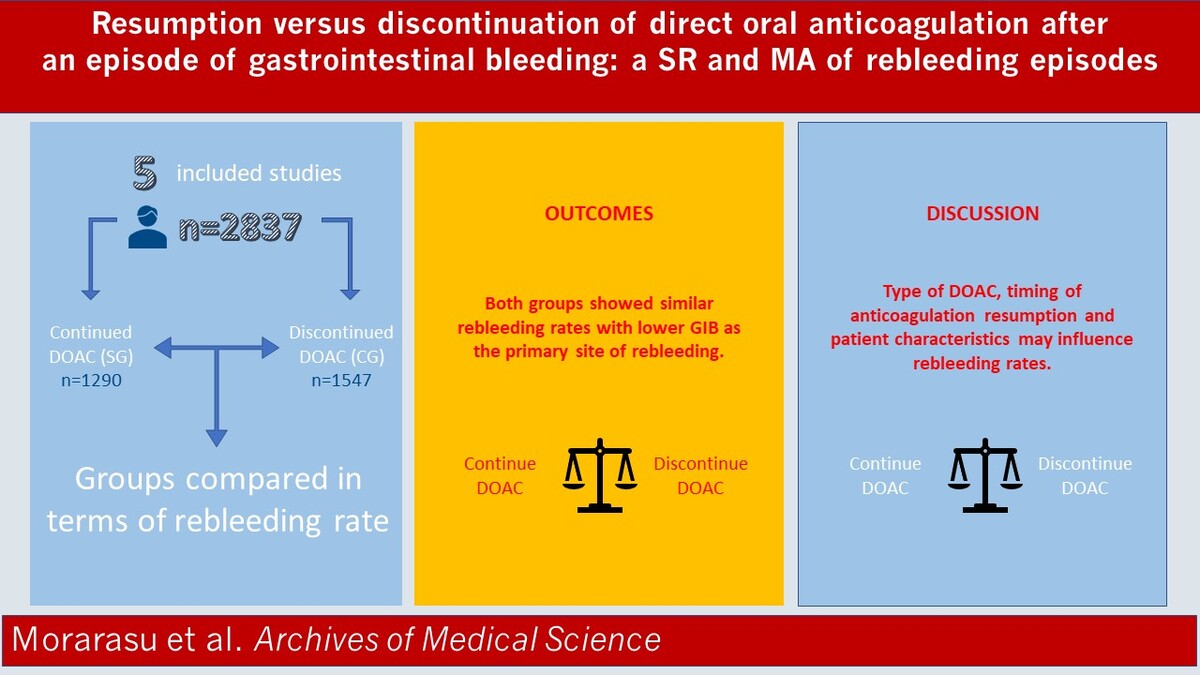Current issue
Archive
Manuscripts accepted
About the Journal
Editorial office
Editorial board
Section Editors
Abstracting and indexing
Subscription
Contact
Ethical standards and procedures
Most read articles
Instructions for authors
Article Processing Charge (APC)
Regulations of paying article processing charge (APC)
Editor's Choice
THROMBOSIS AND HEMOSTASIS / RESEARCH PAPER
Resumption versus discontinuation of direct oral anticoagulation after
an episode of gastrointestinal bleeding: a systematic review and meta-analysis of rebleeding episodes
1
ʽʽGrigore T. Popaʼʼ University of Medicine and Pharmacy, Iasi, Romania. Department of Internal Medicine and Toxicology, Saint Spiridon University Regional Emergency Hospital, 700111 Iasi, Romania., Romania
2
ʽʽGrigore T. Popaʼʼ University of Medicine and Pharmacy, Iasi, Romania. 2nd Department of Surgical Oncology, Regional Institute of Oncology (IRO), Iasi, Romania., Romania
3
ʽʽGrigore T. Popaʼʼ University of Medicine and Pharmacy, Iasi, Romania. Department of Radiology, Emergency Hospital "Prof. Dr. N. Oblu", 700309 Iasi, Romania., Romania
4
ʽʽGrigore T. Popaʼʼ University of Medicine and Pharmacy, Iasi, Romania. Department of Emergency Medicine, Saint Spiridon University Regional Emergency Hospital, 700111 Iasi, Romania., Romania
Submission date: 2024-05-02
Final revision date: 2024-07-31
Acceptance date: 2024-08-12
Online publication date: 2024-09-07
Corresponding author
Stefan Morarasu
ʽʽGrigore T. Popaʼʼ University of Medicine and Pharmacy, Iasi, Romania. 2nd Department of Surgical Oncology, Regional Institute of Oncology (IRO), Iasi, Romania., Iasi, Romania
ʽʽGrigore T. Popaʼʼ University of Medicine and Pharmacy, Iasi, Romania. 2nd Department of Surgical Oncology, Regional Institute of Oncology (IRO), Iasi, Romania., Iasi, Romania
KEYWORDS
TOPICS
ABSTRACT
Introduction:
Background. Direct oral anticoagulants (DOACs) have become standard of care in long term anticoagulation. Extensive research has focused on this new class of drugs that despite their benefits, have an associated risk of bleeding with lack of evidence for management following an episode of gastrointestinal bleeding (GIB). Our meta-analysis and systematic review provide an updated perspective on the rate of rebleeding in patients with an episode of GIB while on DOACs.
Material and methods:
Materials and methods. A systematic search of PubMed, EMBASE and Cochrane databases was performed for all comparative studies examining outcomes in patients that resumed versus withheld DOACs after a baseline episode of GIB. The initial search found 1823 studies. After excluding duplicates and unrelated studies based on abstract triage, 29 full texts were assessed for eligibility, out of which five matched the inclusion criteria and were systematically reviewed.
Results:
Results. Five studies containing data comparing clinical outcomes between patients were included. All studies were retrospective including a total of 2837 patients with a case control design. Both groups showed similar rebleeding rates with lower GIB as the primary site of rebleeding. Type of DOAC, timing of anticoagulation resumption and patients characteristics may influence rebleeding rates.
Conclusions:
Conclusions: Looking at the overall risk/benefit ratio of anticoagulation post GIB, we suggest there is a benefit for oral anticoagulation continuation. Further large scale studies are needed to provide optimal management strategies in this population.
Background. Direct oral anticoagulants (DOACs) have become standard of care in long term anticoagulation. Extensive research has focused on this new class of drugs that despite their benefits, have an associated risk of bleeding with lack of evidence for management following an episode of gastrointestinal bleeding (GIB). Our meta-analysis and systematic review provide an updated perspective on the rate of rebleeding in patients with an episode of GIB while on DOACs.
Material and methods:
Materials and methods. A systematic search of PubMed, EMBASE and Cochrane databases was performed for all comparative studies examining outcomes in patients that resumed versus withheld DOACs after a baseline episode of GIB. The initial search found 1823 studies. After excluding duplicates and unrelated studies based on abstract triage, 29 full texts were assessed for eligibility, out of which five matched the inclusion criteria and were systematically reviewed.
Results:
Results. Five studies containing data comparing clinical outcomes between patients were included. All studies were retrospective including a total of 2837 patients with a case control design. Both groups showed similar rebleeding rates with lower GIB as the primary site of rebleeding. Type of DOAC, timing of anticoagulation resumption and patients characteristics may influence rebleeding rates.
Conclusions:
Conclusions: Looking at the overall risk/benefit ratio of anticoagulation post GIB, we suggest there is a benefit for oral anticoagulation continuation. Further large scale studies are needed to provide optimal management strategies in this population.
Share
RELATED ARTICLE
We process personal data collected when visiting the website. The function of obtaining information about users and their behavior is carried out by voluntarily entered information in forms and saving cookies in end devices. Data, including cookies, are used to provide services, improve the user experience and to analyze the traffic in accordance with the Privacy policy. Data are also collected and processed by Google Analytics tool (more).
You can change cookies settings in your browser. Restricted use of cookies in the browser configuration may affect some functionalities of the website.
You can change cookies settings in your browser. Restricted use of cookies in the browser configuration may affect some functionalities of the website.



